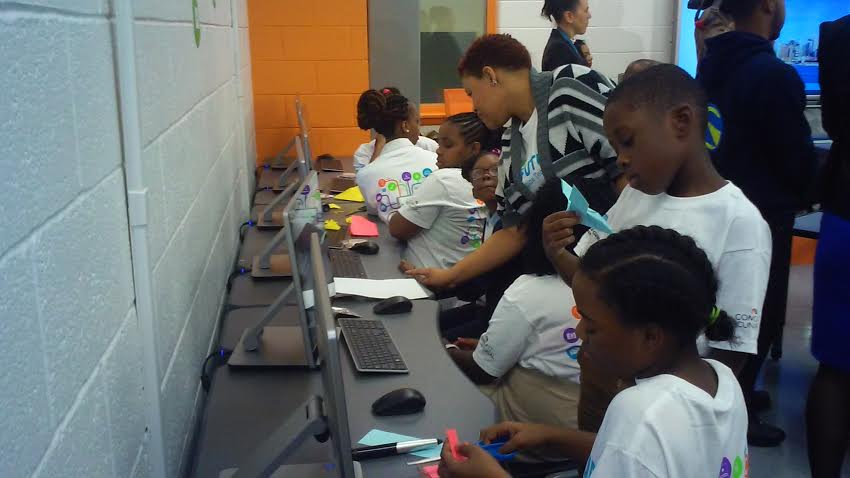For DMV tech leaders, getting resources to the next generation means a lot more than posting funny TikToks (although it probably wouldn’t hurt).
As youth in Gen Z, and even Generation Alpha — born 2010 through 2024 — make their way into teenage years and early adulthood, it has become clearer that tech is a massive part of everyday life. But it doesn’t always translate directly into a career as an engineer or project manager, and many are still learning about the possibilities out there as they consider what comes after high school.
What that means, according to those working with youth, is that there’s more to be done to help kids and teenagers navigate through the tech world.
Technical.ly asked five leaders how the community can help young technologists. Be it internships and apprenticeships, information about what’s out there or just giving them the chance to show their stuff, here’s what leaders in the space want you to know about supporting youth as they build the future.
Emmanuel Apau, CTO, Mechanicode

Emmanuel Apau (Courtesy photo)
“I would love to see software development begin from public schools and have it be a free course,” Apau said. “These kids are growing up with iPads and stuff. They’re playing with apps at two years old. They’re fully invested in the tech scene already, they just don’t know it. But getting them to tie two and two together that, okay, this app that you enjoy so much is also built on code, that you can now learn in school for free, you don’t have to pay a tech after-school program or all that other stuff.
I think that’s one of the key ways the US as a whole is going to stay competitive. Because a lot of kids outside are learning how to code in school at a very early age, and I think it’s becoming a skill set that should no longer be seen as optional but required. I mean, the future is tech, everything is an app. So, if everybody knew how to code, I think that gives us a leg up for sure.”
Brandon Coates, executive director, Black Code Collective

Brandon Coates (Photo via LinkedIn)
“When we talk about Black youth, Latinx as well, they don’t see a lot of us in these new positions. You see [Facebook CEO Mark] Zuckerberg, you see [Twitter CEO] Jack [Dorsey], but you don’t see anyone that looks like me, even for me it’s hard to see that,” said Coates. “So, I think we need to get more people up…It’s not a pipeline problem, it’s an opportunity problem. We need to get out opportunities, but also at the same time, reaching back and saying, hey, look, you can learn this stuff early.
But [tech] is getting more accessible, now we just have to teach them hey, start your skill here and then how you grow it [and] here’s where you can go. Here’s what can get you in the door as start opening stuff up, as well. It’s just communicating that path because a lot of people just don’t know what’s out there.”
Lateefah Durant, VP of Innovation, CityBridge

CityBridge’s Lateefah Durant (photo via LinkedIn).
“I feel like there’s often this skepticism about our young people,” said Durant. “I think there are misconceived notions about our young people, about what they can do and how they can add value to an organization. So, what I want people to take away is that just because someone is in high school or because they’re younger, doesn’t mean that they can’t add value to your organization. It’s worth engaging with schools, even if it’s not an apprenticeship, if it’s internships or if it’s guest speaking opportunities or job-sharing opportunities. It makes good business sense to get engaged with schools and to build and to help schools build that work-based learning continuum while also building your company’s talent pipeline.”
Joe Paul, CEO of Byte Back

Joe Paul, CEO of ByteBack (Courtesy photo)
“The more [youth] are exposed to the opportunities, the more they know that there’s a path. And it’s not just on them in order for them to be exposed, we have to bring it to them. So it’s on us, to [create] exposure by partnering with schools and volunteering and partnering with junior achievers. I think exposure is the biggest thing in making sure that they have access to information on how to get into the world of tech.”
Taylor Poindexter, engineering manager, Spotify

Taylor Poindexter (image via LinkedIn)
“I like the idea of starting younger,” said Poindexter. “People get to college and they, like myself, are introduced to tech for the first time and it’s like, whoa. But my nephew is seven, he’s on the iPad and he crushes it. He asked me what I do for work, and I told him that I build the stuff that can go on his iPad and it blew his mind. So I think making the connections and everything that can really make it more appealing to children, and especially if you make it approachable, those incremental learning blocks are a game-changer for sure.”

This editorial article is a part of Youth Building the Future Month of Technical.ly's editorial calendar. This month’s theme is underwritten by Verizon 5G. This story was independently reported and not reviewed by Verizon before publication.
Before you go...
Please consider supporting Technical.ly to keep our independent journalism strong. Unlike most business-focused media outlets, we don’t have a paywall. Instead, we count on your personal and organizational support.
Join our growing Slack community
Join 5,000 tech professionals and entrepreneurs in our community Slack today!

The person charged in the UnitedHealthcare CEO shooting had a ton of tech connections

From rejection to innovation: How I built a tool to beat AI hiring algorithms at their own game

Where are the country’s most vibrant tech and startup communities?


